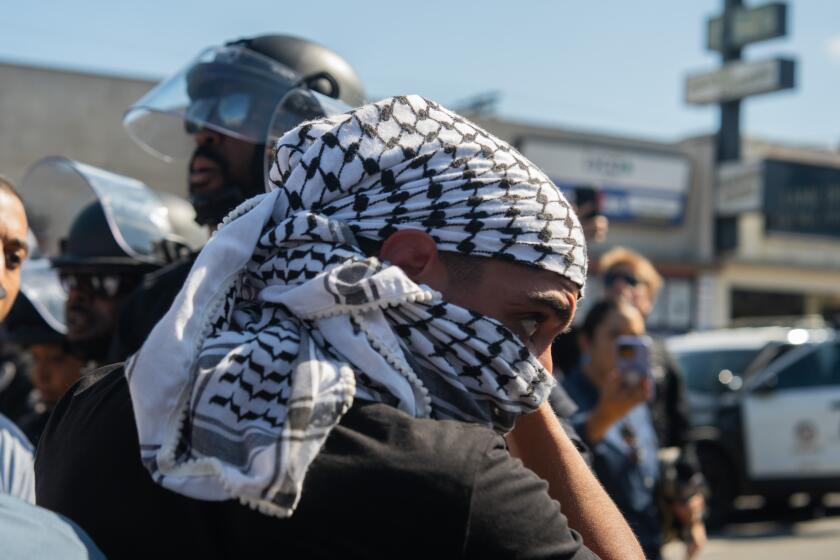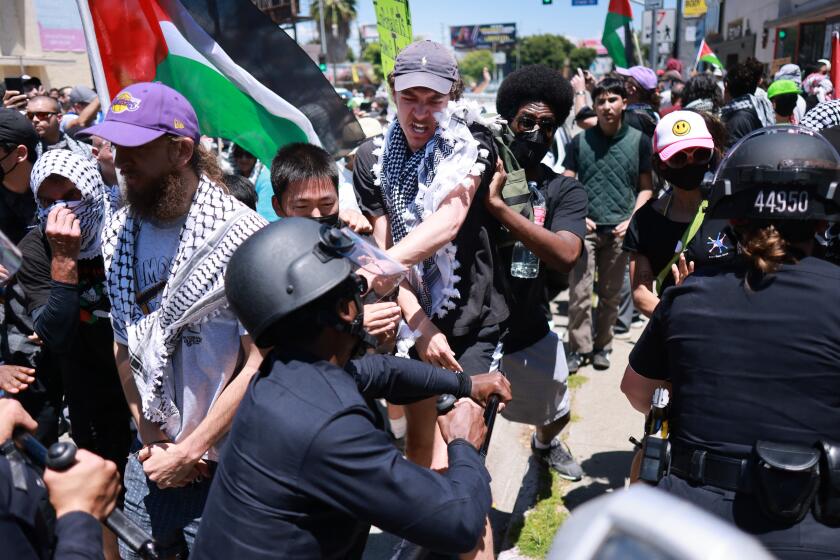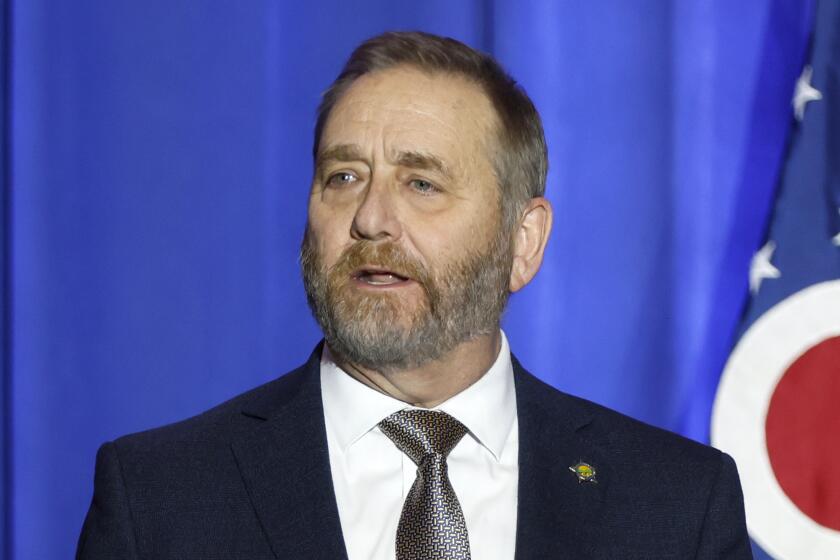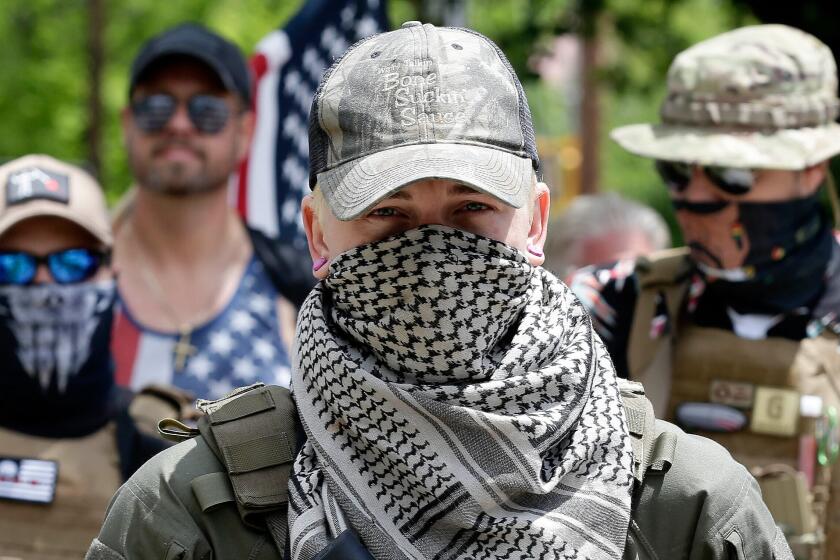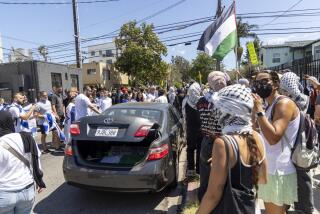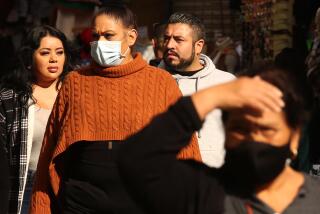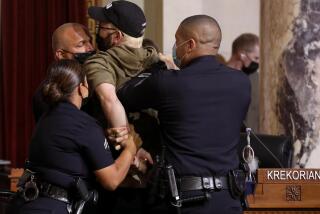Could L.A. enforce antimasking laws for protesters? Experts weigh in
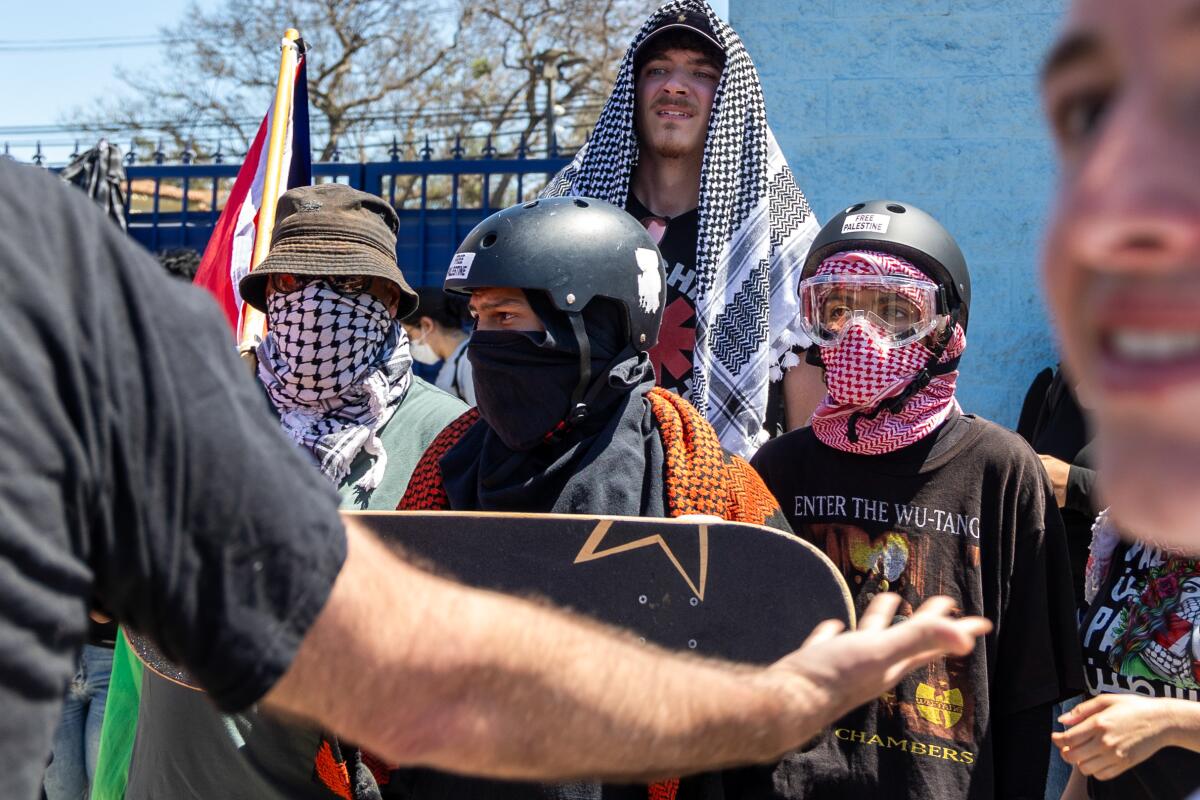
- Share via
In the wake of a violent protest at a Los Angeles synagogue over the weekend, city officials said they would examine what sort of rules are on the books, or might be put in place, to govern whether people should be allowed to wear masks during public demonstrations.
It was unclear what such restrictions might look like — Mayor Karen Bass did not offer a specific proposal, saying only that City Atty. Hydee Feldstein Soto would examine “the idea of people wearing masks at protest[s] and establishing clear lines of demarcation between what is legal and what is not.”
And now Los Angeles may never know. Bass tempered expectations of any kind of restrictions during a news conference on Wednesday.
While she didn’t entirely squash the idea, saying it’s still under consideration, Bass acknowledged that such a law could face legal challenges.
“At this point, we don’t think that this will withstand judicial scrutiny,” Bass said.
The violent protest Sunday at a Jewish temple has prompted Mayor Karen Bass to say Los Angeles should consider rules over demonstrations and the wearing of masks by those protesting.
As the mayor’s comments illustrate, the question of whether to restrict face coverings, which have been regular sights in L.A. and on college campuses during protests surrounding the ongoing war in Gaza, is a thorny one. Cities are being put in the position of trying to strike a balance between protecting people’s right to protest and demonstrate in public — while deterring those who would seek to incite violence.
There are also public health implications in a world still bearing the scars of the COVID-19 pandemic.
“There’s no clear answer to antimasking laws,” because governing bodies must take into consideration the protection of anonymous free speech, said Barry McDonald, a law professor at Pepperdine University who focuses on 1st Amendment law.
However, drafting a city ordinance that bans mask wearing in public is conceivably a possibility, said Eugene Volokh, a 1st Amendment law professor at UCLA.
Sunday’s demonstration sparked condemnation from national and state elected officials, including Biden. Protesters, meanwhile, condemned police tactics.
Why did this issue come up now?
On Sunday, a demonstration outside the Adas Torah synagogue in the predominantly Jewish Pico-Robertson neighborhood devolved into violence. Fights broke out between pro-Palestinian demonstrators — who said they were protesting an event at the synagogue promoting the sale of stolen Palestinian land — and supporters of Israel.
Several people in the crowd were wearing disposable face masks or kaffiyehs that covered their faces, leaving only their eyes visible.
The use of facial coverings at such protests has spurred debate in some circles and at times frustrated law enforcement. When a mob attacked a pro-Palestinian camp at UCLA in May, police had difficulty identifying suspects because many wore masks.
Even before Tuesday night’s bloody physical altercations, protesters occupying a pro-Palestinian encampment at UCLA said counterdemonstrators have assaulted them nightly with a jarring barrage of light and sound.
Are there existing antimasking laws in California?
Historically, at least 18 states and Washington, D.C., adopted antimasking laws to combat the masks and hoods utilized by members of the Ku Klux Klan, McDonald said.
California did previously have a law on its books, enacted in 1923, that made it a misdemeanor for someone to wear a mask to conceal his or her identity in a public place. However, the constitutionality of the law was challenged after it was used to justify the arrest of Iranian nationals protesting the shah of Iran’s regime in front of the Iranian Consulate in San Francisco in 1978.
The individuals arrested were students and members of the Iranian Students Assn. who had placed copies of the leaflets they were handing out on their faces to conceal their identities. The California 1st District Court of Appeal later determined the students were peacefully protesting at the time they were arrested and had reason to fear retaliation by the Iranian government against them and their relatives in Iran. The use of the law was found unconstitutional and the law itself was invalidated.
The U.S. Supreme Court has yet to rule definitively on the constitutionality of antimasking laws, and different courts and jurisdictions have gone different ways depending on how particular statutes were written, McDonald said.
Ohio official warns that a law to deter Ku Klux Klan demonstrations could be used to charge students who wear masks during pro-Palestinian protests.
But general mask bans do exist. South Carolina’s law states that no person over the age of 16 shall wear a mask that conceals their identity in public. The law does have exemptions, including holiday costumes, masks that are involved in a person’s employment, theater productions and masks used during a civil defense drill, according to the International Center for Not-For-Profit Law.
Some antimask rules also remain on the books in California. Volokh found old ordinances, which he presumes are outdated, in the cities of Oakland, Modesto and Lomita.
Oakland’s ordinance states that it is unlawful for a person in the city to appear in public in a mask that conceals the wearer’s identity — except during carnivals.
In Modesto, face coverings aren’t allowed at demonstrations, rallies, protests and public assemblies. The exception is a covering that’s worn due to religious beliefs or as a medical necessity.
A collective research effort has cropped up to name and shame the pro-Israel demonstrators who carried out violence at UCLA. Distrusting police to deliver justice, people are taking it upon themselves.
Lomita’s ordinance says a person cannot wear a mask in a public street without a permit from the sheriff.
There are two issues with these ordinances, Volokh said. They’re broad and can be challenged in court. Secondly, enforcing them can prove difficult.
How, Volokh said, can a law enforcement officer know just by looking at someone at a demonstration whether they’re wearing a mask for religious reasons or because they have a medical condition, especially post-pandemic?
“If the whole point is to say at these protests, ‘We want everybody’s identity to be known,’ any time you have exemptions that makes it much harder to make the law effective,’” he said.
Republican lawmakers in North Carolina want enhanced penalties for people wearing a mask while committing a crime or blocking traffic during protests.
Can an antimask ordinance violate free speech rights?
There is a narrower antimask law in California that says a person cannot wear a mask or disguise to evade detection or arrest in the commission of a crime.
But, McDonald pointed out, “The government can’t presume that just because you wear a mask in a protest that you’re intending to commit a crime with it or evade detection.”
People who wear a mask while demonstrating or protesting could do so because they want to avoid facial recognition technology, intimidation, harassment, reprisal or being doxxed, he said.
If a mask-wearing protester uses the covering to commit unlawful acts and then attempt to evade police detection or arrest, then they could be prosecuted.
“There’s a very strong argument that you have the constitutional right to wear a mask,” McDonald said. “As long as you’re doing it for legitimate reasons and you’re engaging in peaceful protest.”
More to Read
Sign up for Essential California
The most important California stories and recommendations in your inbox every morning.
You may occasionally receive promotional content from the Los Angeles Times.
